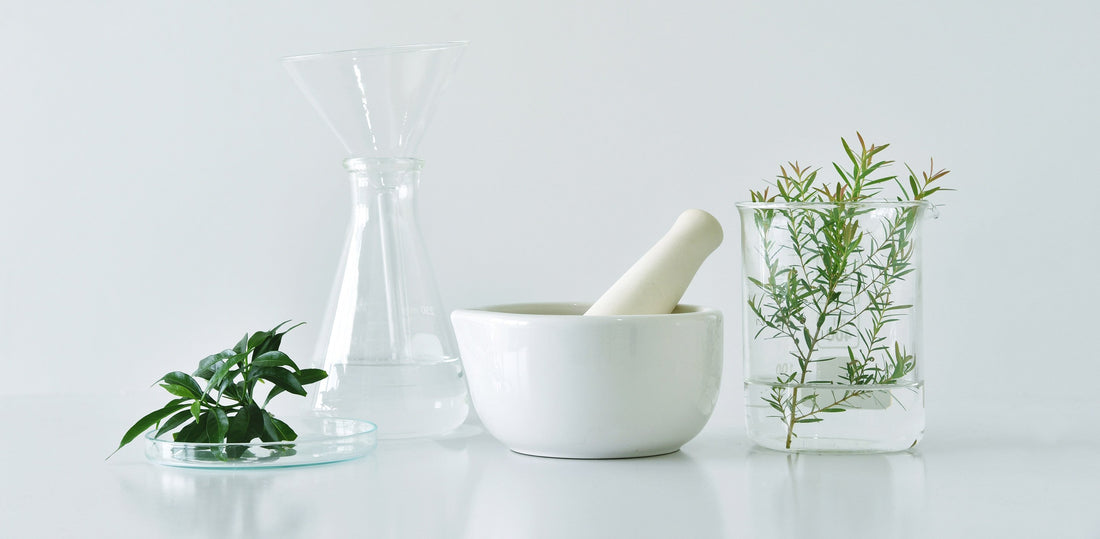
Natural Herbs That Are Safe For Cats And Dogs
Share
At Homescape Pets, we love to talk about holistic health and healing. But we also know that the herbal or homeopathic path isn’t always easy! The world of herbal remedies can be overwhelming, especially if you’re new to it.

But, even if you consider yourself an herbal veteran, you don’t always know if what you have lying around is actually safe for your pets. If you have a green thumb, you could be harvesting seemingly innocuous herbs that are actually harmful to pets, like chives or scallions!
As an herbal consumer, we want you to be as fully informed as possible without the anxiety of unwittingly hurting your pets, so we’re going to go over several safe herbs, the benefits of each one, and how you can use them!
It's always a good idea to discuss herbal treatments with your vet to make sure there aren't any potential contraindications with medications or lifestyle.
Here are our favorite all-natural herbs that are safe for cats and dogs:
Chamomile
Chamomile (Matricaria recutita) is commonly used in human teas for its soothing properties, but it has similar benefits for cats and dogs as well. Additionally, chamomile is said to have antispasmodic properties, which means it can help if your pup suffers from the kind of anxiety that leads to gastrointestinal distress.
Valerian
Like chamomile, valerian (Valeriana officinalis) is known to relieve stress and anxiety, but it’s also widely used to promote a good night’s sleep. We were excited to find that valerian is safe for both cats and dogs. When given to dogs, valerian can encourage calmness in stressful situations, all without the harsh chemicals of pharmaceutical sedatives. We also learned that cats often react the same way to valerian as they would catnip, as valeric acid works similarly to cat pheromones!
Chamomile and valerian work extremely well together as a natural sedative. Try our Restful Pet tincture for stressful situations like thunderstorms, vet/groomer visit and holidays!
Ashwagandha
Used in Ayurvedic medicine, Ashwagandha (Withania somnifera) is a highly regarded and widely used herb that is also safe for pets. Ashwagandha is considered to be an adaptogen, meaning that it helps the body adapt to stress and can help with specifically what your body needs at the time, normalizing the body’s response. This herb is also said to have antibacterial, diuretic, sedative, and anti-inflammatory properties, making it one of our favorite “wonder herbs”!
Milk Thistle
You might not be surprised to find milk thistle (Silybum marianum) on this list, as it is a very popular herb in both conventional and alternative medicine. In fact, many holistic veterinarians will recommend milk thistle for cats with liver and kidney conditions, as well as diabetes and cancer. Milk thistle is great for dogs too, having the same antioxidant and liver regenerating effects. It's very safe and is a great herb to use after giving your pet necessary pharmaceuticals to reduce negative reactions, side effects and general detoxification.
Calendula
A common plant you can grow yourself, calendula (Calendula officinalis) is not often associated with pets, but it actually has many surprising benefits! You can use calendula topically to help soothe skin irritations or inflammation. When ingested, calendula is also useful for its antifungal qualities. We love calendula because it’s not only easy to grow in virtually any soil, but it is easy to find in most health food stores.
Echinacea
In humans, echinacea (Echinacea purpurea) has long been considered a safe and effective way to promote healthy immune systems. Studies now show that it can help cats in the same way. Like calendula, echinacea is a fairly accessible herb—most health food stores and even regular supermarkets carry it in some form. Brewed into a tea, it can be added to kitty’s water to help with her overall health. Echinacea is safe for dogs too, and can even help treat chronic respiratory infections!
Goldenseal
Another “wonder herb,” Goldenseal (Hydrastis canadensis) is known to have several benefits for dogs, from digestive conditions, kennel cough, tapeworms, and more! Goldenseal can be used as a dried powder, brewed into a tea, or made into a tincture—all while being completely safe for dogs. Holistic veterinarians also recommend goldenseal to stimulate cats’ immune systems and to support intestinal health.
Dandelion Root
We’re no longer thinking of dandelions as unwanted weeds! In fact, you may want to try growing it yourself (unless you live in an area completely free or herbicides and pesticides, wild harvest is not recommended), as an herbal remedy for both cats and dogs. Like many of the other herbs on this list, dandelions (Taraxacum officinale) have been used medicinally for thousands of years and for good reason. Dandelion not only functions as a treatment to illness, but is rich in vitamins, iron, manganese, and other nutrients your pet needs. Dandelion root has been used as a liver and kidney tonic, helping to rid the body of toxins and waste. Try using dandelion with goldenseal and milk thistle to enhance each of their antibiotic properties!
Licorice Root
Licorice (Glycyrrhiza glabra) may be most commonly known as a candy, but it’s actually a legume. Residing in the pea family, licorice is considered beneficial as an anti-inflammatory agent, helping cats and dogs with a variety of conditions. Try using licorice root to treat eczema, itching, respiratory problems, and gastrointestinal issues. Licorice root has also been used as a kind of natural cortisone for cats with skin issues and can help treat indigestion because of its soothing properties.
Turmeric
Often associated with its function in cooking, turmeric (Curcuma longa) is surprisingly useful when used as an herbal remedy. Studies suggest that turmeric may have anti-inflammatory, antioxidant, and even anti-cancer properties. Some holistic vets recommend turmeric to treat inflammatory conditions like arthritis. We love turmeric so much, in fact, that we’ve incorporated it into a few of our own supplements for pets! Try our Calming Relief Hemp & Turmeric Oil for inflammation, our Mussel Mobility Green Lipped Mussel & Turmeric for Pets, formulated to support healthy joint movement and stiffness, or our Mussel Mobility Complete with CBDA for enhanced joint support and relaxation.
The best part is, all of our natural supplements use clean ingredients from botanical, mineral, and natural sources, with no chemical additives. It’s the very reason this list of safe herbs exists… to help you give your pet the natural lifestyle he or she deserves!
What are your favorite herbs to use with pets? Any other ones you’re thinking of using on your pet? We’d LOVE to hear!

9 comments
What about giving cats and dogs colostrum, probiotics and also bee propolis
please include thyme, it really helps with a cats digestive system. I gave some to my cat (a very little amount) after she drank some of my brothers spilled milk and was crying in pain about half an hour later. It worked well and I’ve started to give her a little bit every week because she hunts and eats her kill. Im no pet or herb specialist but I did see thyme on other lists and my cat isn’t dead two years later so I’m a hundred percent sure its safe.
Please consider including quercetin in your list of herbs for pets. I have been giving my cat a tiny dose (about 1/20th of a human dose) in her food twice a day for a year. It has completely stopped her pulling out the fur on her belly and legs. When my other cat started doing the same thing, quercetin had effect. She doesn’t have allergies like the first cat, I think she’s just restless and edgy. (Siamese). So I’m giving her ashwaganda, and it does seem to be helping.
Hello. As a student of herbalism, I wish you would have provided the Latin/scientific names for the herbs listed. Using only common names can get confusing because there can be several plants with the same common name and also known by many different common names. For instance, the Chamomile you mentioned is actually also more specifically known as (common name) German Chamomile, (Latin name) Matricaria recutita. It should not be confused with Roman Chamomile, Chamaemelum nobile (AKA Anthemis nobilis), which is toxic to cats (& maybe other animals.). Other herbs on your list that can be confusing are: Milk Thistle, Licorice, and there are actually 3 varieties of Echinacea that can be used. Milk Thistle is likely supposed to be Silybum marianum and not Cnicus benedictus; Licorice is likely Glycyrrhiza glabra and not Helichrysum petiolare (There are also several varieties of Glycyrrhiza that are sold, not just “glabra”.); Echinacea could be E. purpurea, E. angustifolia or E. pallida – each has similar actions, but also specifics that could make one more effective than another. Please research your herbs before giving them to your pet and be sure it’s the correct one! Verifying with the scientific/Latin name is usually the easiest way to make sure you have the correct plant, but even these names can be reclassified and changed. (That’s what happened to the name for Roman Chamomile…)